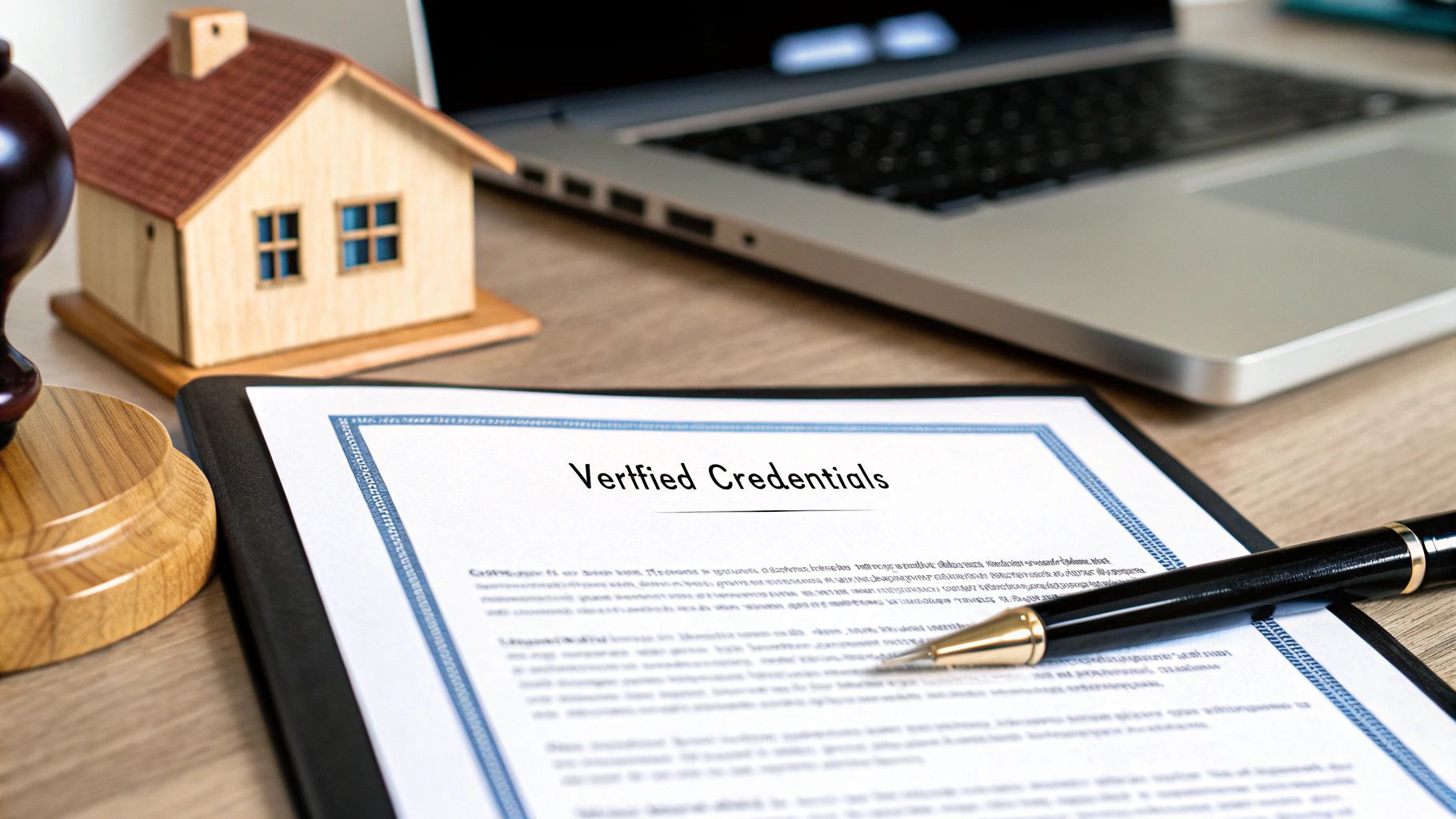How to Pick a Real Estate Broker: Your Success Guide
Why Your Broker Choice Makes or Breaks Your Deal

Choosing the right real estate broker is a pivotal decision in your property journey. It's not simply about finding someone to unlock doors; it's about partnering with a skilled advisor who can navigate the intricacies of the market. This choice significantly impacts your negotiating position, the timeframe of your deal, and the final price.
The Impact of a Skilled Broker
A skilled real estate broker offers a wealth of knowledge and experience. They understand market dynamics, property assessments, and effective negotiation strategies. For instance, a seasoned broker can identify potential issues with a property that a buyer might overlook, preventing costly repairs later. They also have an extensive network of contacts, including other agents, lenders, and inspectors, which can expedite the entire buying or selling process.
This expertise directly translates to a more favorable outcome. A high-performing broker can often negotiate a better deal than you could achieve independently. They know how to present your offer effectively, emphasize your property's strengths, and address any concerns the other party may have. This can translate to significant financial gains.
The Risks of Settling for Less
Conversely, choosing an inexperienced or less effective broker can have detrimental consequences. A broker lacking local market knowledge might misprice your property, resulting in a longer time on the market or a lower sale price. They might also struggle to negotiate effectively, leaving potential profit untapped.
A broker who is unresponsive or lacks communication skills can add unnecessary stress and frustration. Imagine losing your dream home because your broker failed to relay an offer promptly. These scenarios highlight the importance of thoroughly vetting potential brokers and selecting someone dedicated to your success. Choosing the right real estate broker significantly impacts your property transactions. In the United States, approximately 90% of homebuyers and sellers use an agent or broker. This reliance underscores the importance of choosing a reputable professional. In 2023, the global real estate brokerage market was valued at roughly $792 billion, reflecting the substantial role brokers play worldwide. More detailed statistics can be found here: https://www.factmr.com/report/real-estate-brokerage-market
Why Expertise Matters
The difference between an exceptional broker and an average one can be substantial. Top performers use their networks and market knowledge to uncover opportunities others miss. They understand market nuances and anticipate shifts in buyer behavior. This proactive approach helps them position your property for success and secure the best possible outcome. Choosing your real estate broker is an investment in your future and deserves careful thought.
Decoding Credentials That Actually Matter

Not all real estate licenses and certifications carry the same weight. Understanding the nuances between basic qualifications and advanced designations is key to selecting the right broker for your needs. This knowledge helps you identify genuine expertise and avoid misleading marketing tactics. It's about understanding what truly matters for your specific real estate goals.
Understanding the Licensing Landscape
Each state requires a basic real estate license for brokers. This license confirms the broker has met the minimum legal requirements and passed the required exams. However, simply holding a license doesn't guarantee extensive market knowledge or specialized skills. It's a starting point, not a guarantee of expertise.
Beyond the Basics: Advanced Designations
For a deeper understanding of a broker's expertise, look for professional designations that go beyond the basic license. These designations indicate advanced training and specialization in specific real estate areas. For example, a Certified Residential Specialist (CRS) designation signifies advanced training in representing home buyers and sellers. An Accredited Buyer's Representative (ABR) designation, on the other hand, focuses specifically on buyer representation. These advanced certifications can provide added confidence in a broker's ability to handle more complex situations.
Verifying Credentials and Spotting Red Flags
Before making a decision, it's essential to verify a broker's credentials. This includes checking their license status with your state's real estate regulatory body. Also, look for any disciplinary actions or complaints filed against them. Any inconsistencies should be considered red flags. These steps help ensure you're working with a reputable and ethical professional. The real estate brokerage market is geographically diverse, with key regions like Asia-Pacific, North America, and Europe. Asia-Pacific led the market in 2024, followed by North America. This global distribution highlights the importance of a broker's familiarity with local markets. You can learn more about the global market here: Real Estate Agency and Brokerage Global Market Report
Ongoing Education and Specializations: Signs of Commitment
A broker dedicated to ongoing education and professional development demonstrates a commitment to staying current with market trends and best practices. This continued learning translates to better service and more informed advice for clients. Consider asking potential brokers about their recent training and certifications.
How Credentials Impact Complex Transactions
Varying credential levels can significantly influence a broker's ability to handle complex transactions. For instance, a broker with a Certified Commercial Investment Member (CCIM) designation is better prepared to handle commercial real estate deals. This specific expertise is vital for navigating complex negotiations and legal requirements in commercial transactions.
Insider Tips for Researching a Broker
Thoroughly researching a broker's professional standing is a crucial step in the selection process. Online reviews and testimonials can offer valuable perspectives on past client experiences. Checking their online presence and social media profiles is also beneficial. A strong online presence and positive reviews can indicate an active and respected broker within the industry. Choosing the right broker takes time and effort, but finding the right partner to effectively navigate the real estate market is a worthwhile investment.
Testing True Local Market Mastery

Local expertise is a crucial factor when selecting a real estate broker. It's the difference between someone who simply sells in an area and someone who truly understands its nuances. But how do you distinguish genuine market knowledge from a polished sales pitch? It requires careful evaluation, going beyond superficial claims and digging deeper into their actual understanding of your target neighborhood.
Beyond the Sales Pitch: Assessing True Local Knowledge
A broker’s claims of familiarity with an area shouldn't be accepted at face value. Instead, look for demonstrable proof of their local market mastery. Ask specific questions about recent sales data, neighborhood trends, and potential challenges.
For instance, inquire about their understanding of local school districts, planned developments, and zoning regulations. This will reveal the depth of their knowledge and their ability to anticipate factors that can influence your investment.
Evaluating Recent Transaction History
A broker's recent transaction history in your desired area is very telling. Request a list of properties they've recently sold or helped clients purchase in the neighborhood. Pay attention to the price points, days on market, and the types of properties involved.
This data provides valuable insights into their practical experience and success within your specific market segment.
The Power of Neighborhood Relationships
A broker deeply connected to the local community has a significant advantage. Strong neighborhood relationships can often uncover off-market opportunities and provide valuable insights not readily available to others. They might know about upcoming listings before they're publicly advertised or have connections with local contractors and service providers.
Ask about their involvement in community events and their network of local professionals.
Understanding Pricing Dynamics and Negotiation Prowess
True local market mastery includes a deep understanding of pricing dynamics. Your broker should be able to explain recent price fluctuations, predict future trends, and justify their pricing strategies with data-backed insights.
Equally important is their track record of successful negotiations in the area. Ask for examples of how they've handled difficult negotiations and achieved positive results for their clients. This shows their skill in securing the best possible deals within the local market.
Key Questions to Uncover Local Expertise
- "What are the current market trends in this neighborhood, and how do you anticipate them changing in the next six months?"
- "Can you share examples of recent transactions you've handled in this area, including the challenges faced and how you overcame them?"
- "What are some hidden advantages or potential drawbacks of this neighborhood that someone unfamiliar with the area might not know?"
- "How do you connect with local professionals (e.g., inspectors, appraisers, contractors) to ensure seamless transactions?"
- "What is your strategy for pricing properties in this market, and can you provide examples of successful negotiations?"
By focusing on specific questions and proven assessment methods, you can effectively evaluate a broker’s true local market expertise. This ensures you choose a partner who understands the area and possesses the skills and knowledge to maximize your real estate investment.
Evaluating Communication Style and Tech Savvy
In today's real estate market, effective communication and technology skills are essential for brokers. Finding a broker who excels in both areas can significantly impact your success in buying or selling a home. This section explores how to assess these crucial aspects when choosing the right real estate broker for you.
Assessing Responsiveness and Communication Preferences
A broker's responsiveness speaks volumes about their dedication to client service. Pay close attention during your initial consultations. How quickly do they respond to your calls and emails? Do they truly listen to your needs and provide thorough answers to your questions? These initial interactions can offer valuable insights into their overall communication style.
It's also important to understand their preferred methods of communication. Some brokers favor phone calls, while others primarily use email or text messaging. Make sure their preferred methods align with your own communication style. For example, if you value quick text updates, a broker who primarily communicates through email may not be the ideal fit.
The Importance of Tech Savvy in Today's Market
Technology is transforming the real estate landscape. A tech-savvy broker can utilize digital tools to effectively market properties, access up-to-the-minute market data, and streamline the entire transaction process. This technological advantage can be the deciding factor in a competitive market.
Ask potential brokers about the specific technology they use. Do they use a Customer Relationship Management (CRM) system like Contactually? Do they employ virtual tour software like Matterport or use drone photography to showcase properties? These tools can greatly enhance your experience and improve the efficiency of buying or selling.
To understand how different communication methods and technology work together, let's look at the following comparison:
Broker Communication and Technology Comparison: A comparison of different communication styles and technology tools used by modern real estate brokers
| Communication Method | Response Time | Best For | Technology Integration |
|---|---|---|---|
| Phone Call | Typically within a few hours | Complex questions, building rapport | CRM systems for logging calls, scheduling follow-ups |
| Within 24 hours | Sharing documents, detailed information | E-signature software, document management systems | |
| Text Message | Within minutes to a few hours | Quick updates, scheduling showings | Automated text message updates, appointment reminders |
| Video Conferencing | Scheduled in advance | Virtual tours, meetings with out-of-town clients | Virtual tour software, screen sharing capabilities |
This table highlights how different communication methods are suited for various purposes and how technology can enhance each one. Choosing a broker who effectively utilizes these tools can streamline communication and ultimately improve your real estate experience.
Evaluating Technology Use and its Impact
A broker’s use of technology should empower you, the client. Do they provide access to online portals where you can track your transaction's progress? Do they use DocuSign for electronic signatures to expedite paperwork? These tools can significantly reduce stress and improve overall efficiency.
Practical Tests and Questions to Ask
- Responsiveness Test: Send an email or leave a voicemail and note their response time. A reasonable response time within 24 hours demonstrates strong communication practices.
- Communication Style Inquiry: Ask about their preferred communication methods and how often they typically provide updates.
- Tech Tools Assessment: Inquire about the specific technology they use and how these tools benefit their clients.
- Emergency Scenario Question: Pose a hypothetical urgent situation, like a last-minute offer, to gauge their adaptability and communication under pressure.
By carefully evaluating these aspects, you can select a broker who understands your needs and possesses the necessary tools and expertise to navigate today's real estate market effectively.
Understanding Commission Structures and Contract Terms
Navigating the financial aspects of working with a real estate broker can feel overwhelming. However, understanding commission models and contract terms is crucial for informed decision-making. This knowledge empowers you to negotiate effectively and ensures a fair return on your investment.
Demystifying Commission Models
Traditionally, real estate brokers operate on a percentage-based commission, typically calculated as a percentage of the property's final sale price. However, alternative fee arrangements are becoming increasingly prevalent.
Some brokers offer flat-fee services, charging a fixed amount regardless of the sale price. Others may use a graduated commission structure, where the percentage fluctuates based on the final sale price. Understanding these different models allows you to compare brokers effectively and choose the structure that aligns with your needs and budget.
Exploring Alternative Fee Arrangements
Beyond the traditional percentage-based model, several alternative fee arrangements exist. These options offer flexibility and cater to different budgets and transaction types.
- Hourly Consulting Services: Pay for expertise on an hourly basis. This approach can be suitable for specific tasks like property valuation or negotiation support.
- Performance-Based Fee: The broker receives a higher commission for exceeding a pre-agreed sales target, incentivizing them to achieve optimal results.
Understanding these alternatives allows you to explore options beyond the traditional structure.
Evaluating Value Proposition: Beyond the Fee
While the commission fee is important, it shouldn't be the sole factor in your decision. Focus on the overall value proposition offered by each broker.
- What specific services are included?
- Do they offer staging services, professional photography, or marketing expertise?
These added services can significantly impact your property's marketability and influence the final sale price. A broker with a slightly higher commission but a comprehensive marketing package might offer better overall value. You might be interested in: Switching Real Estate Brokerages.
Negotiating Contract Terms: Ensuring Flexibility
Before signing a contract, thoroughly review the terms and conditions, including the duration of the agreement, the broker's responsibilities, and the cancellation policy.
Negotiate terms that offer flexibility and protect your interests. Consider including an opt-out clause to terminate the contract under specific circumstances without penalty. A well-structured contract safeguards your investment and provides recourse if unexpected issues arise.
Timing Considerations and Mid-Transaction Changes
Understanding the timing implications of your contract is vital. Consider the agreement's validity period and the process for making mid-transaction changes, such as adjusting the asking price or listing date.
Discuss these scenarios with potential brokers and ensure the contract addresses them clearly. This proactive approach ensures a smoother transaction.
Ensuring Fair Value and Navigating Exclusive Agreements
Getting fair value involves more than just seeking the lowest commission. Consider the broker's expertise, marketing strategies, and negotiation skills. These factors significantly contribute to the transaction's outcome and can justify a slightly higher fee.
An exclusive right-to-sell agreement grants the broker exclusive rights to market and sell your property. While this incentivizes the broker, ensure the contract includes provisions for performance expectations and termination options. By focusing on the overall value and negotiating favorable terms, you can ensure a successful real estate experience.
The Interview Process That Reveals Everything
Knowing the right questions to ask potential real estate brokers and recognizing early warning signs can save you from a frustrating and potentially costly experience. This section provides an interview framework to help differentiate exceptional professionals from those just skilled in sales. It's about finding a partner dedicated to working for you.
Structuring a Productive Broker Interview
Before interviewing, gather key information about your needs and goals. What type of property are you seeking (or selling)? What's your budget and timeframe? Understanding your priorities will help you formulate targeted questions.
Begin interviews with open-ended questions to encourage brokers to share their experience and approach. Ask about recent successes and challenges in the local market. This helps you assess their communication style and understanding of the current real estate climate.
Key Questions to Reveal Expertise
- "How long have you been working in this specific market?"
- "What are your strategies for finding (or selling) homes in a competitive market?"
- "Can you walk me through your typical process from start to finish?"
- "How do you handle multiple offers or bidding wars?"
- "What's your communication style, and how often will I receive updates?"
These questions reveal experience, strategic thinking, and communication style. Pay attention to what they say and how they say it. Confidence combined with clear explanations demonstrates a deep understanding of their profession.
Checking References Effectively
Don't skip checking references! Request at least three references from recent clients. Ask about their overall experience. Were they satisfied with the broker's communication, responsiveness, and negotiation skills? Did they feel supported? Honest feedback from past clients offers invaluable insights.
Recognizing Red Flags
Be wary of brokers who:
- Overpromise or guarantee results
- Pressure you into signing a contract quickly
- Avoid answering your questions directly
- Have consistently negative online reviews
- Lack a strong understanding of the local market
Trust your instincts. If something feels off, it probably is.
Optimal Timing and Number of Interviews
Ideally, start your broker search a few months before buying or selling. This allows ample time for research and interviews. Interview at least three brokers to compare approaches and personalities, enabling an informed decision. You might be interested in: How to Negotiate Real Estate Commission.
Gathering Information for Your Final Decision
Before deciding, compile all gathered information. Compare commission rates, services offered, experience levels, and communication styles. Consider which broker best aligns with your needs and personality. Choosing the right broker is crucial for a successful and stress-free transaction. Make this decision carefully to achieve your real estate goals.
Making Your Final Choice and Setting Expectations
After researching potential real estate brokers, interviewing top candidates, and considering their qualifications, it's time to make your final decision. This is more than just picking a name; it's a systematic process of weighing factors and choosing the broker who best fits your needs. Setting clear expectations from the start is crucial for a successful partnership.
Weighing the Factors: A Systematic Approach
Use a scorecard or spreadsheet to compare brokers objectively. List criteria like local market expertise, communication style, technology proficiency, commission structure, and overall value proposition. Weight each factor based on its importance. For example, if local expertise is crucial, give it a higher weight than commission rates. Score each broker based on their performance. This provides a clear, data-driven way to make your decision.
Choosing the Best Fit: Aligning With Your Needs
Think about your circumstances and preferences. Are you a first-time homebuyer or a seasoned investor? Do you prefer texts or occasional emails? Do you value a tech-savvy broker or a traditional approach? The best fit isn’t always the broker with the most experience or lowest commission, but the one who understands your specific needs.
Setting Clear Expectations: The Foundation for Success
Once you've chosen your broker, set clear expectations for communication, responsiveness, and reporting. Discuss preferred communication channels and update frequency. For example, agree on weekly calls to review progress or daily email updates on new listings. This upfront planning fosters transparency and ensures everyone is aligned.
Establishing Communication Protocols and Accountability
Formalize your relationship with a written agreement outlining each party's responsibilities. This should cover communication protocols, reporting frequency, and key performance indicators (KPIs). This formalizes the partnership and creates accountability. For example, if you want to sell your house within two months, include that timeline. This creates a shared understanding and reinforces commitment. You might be interested in: Learn more in our article about 100% Commission Real Estate.
Milestone Tracking and Maintaining a Productive Partnership
Regularly track progress toward your goals. Set milestones and review them with your broker. This helps identify potential roadblocks early and allows for adjustments. For example, if your property hasn't received offers after a certain time, discuss changes to the marketing strategy or pricing. This proactive approach maximizes efficiency and boosts your success chances. The global real estate market is vast, valued at approximately $637 trillion. The commercial real estate brokerage and management market was valued at $264.74 billion in 2023 and is projected to grow. Find more statistics here: https://contentsnare.com/real-estate-agent-statistics/
Addressing Issues and Considering Alternatives
Open communication is essential. If concerns arise, address them promptly with your broker. If the relationship isn't working, explore other options. You can switch brokers if your initial choice is unsatisfactory. Having a backup plan protects your interests.
Ready to start your real estate journey? Visit Ashby Graff Careers to connect with top agents dedicated to helping you achieve your goals. Whether you're buying, selling, or investing, Ashby & Graff provides the resources and expertise you need.






